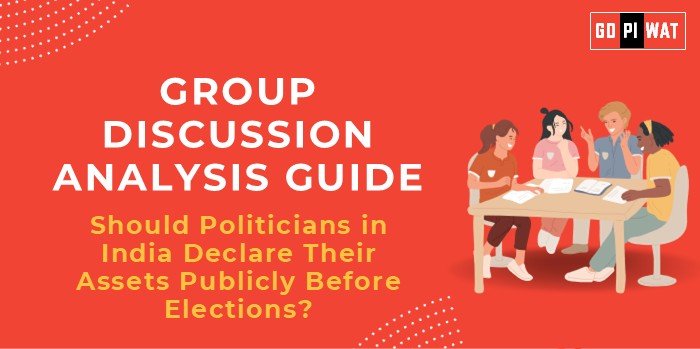📋 Group Discussion Analysis Guide: Should Politicians in India Declare Their Assets Publicly Before Elections?
🌟 Introduction to the Topic
Opening Context:
Transparency in politics is a cornerstone of democratic integrity. The debate over whether Indian politicians should publicly declare their assets before elections is pivotal in promoting accountability and reducing corruption.
Topic Background:
India mandates that electoral candidates submit asset details to the Election Commission. However, public accessibility to these disclosures remains limited, raising concerns about their effectiveness in fostering trust.
📊 Quick Facts and Key Statistics
- 💰 Average Assets of Indian MPs (2023): ₹38.33 crore
- ⚖️ Percentage of MPs with Criminal Cases (2023): 40%
- 🌍 Global Benchmark: In the U.S., candidates must publicly declare assets under Federal Election Commission regulations.
- 📉 Public Trust in Politicians: India ranked 85th out of 180 countries in Transparency International’s Corruption Perceptions Index 2022.
🧩 Stakeholders and Their Roles
- 🗳️ Election Commission of India (ECI): Ensures compliance with asset declaration mandates.
- 🏛️ Political Parties: Responsible for internal transparency and candidate selection.
- 📢 Civil Society Organizations: Advocate for reforms and monitor disclosures.
- 🧍 Citizens: Utilize disclosures to make informed electoral choices.
🏆 Achievements and Challenges
✨ Achievements:
- ✔️ Mandatory asset declarations have increased scrutiny of candidates.
- ✔️ Media and civil society analyses highlight discrepancies, leading to public debates.
- ✔️ Legal challenges stemming from significant discrepancies promote accountability.
⚠️ Challenges:
- ❌ Public access to asset disclosures remains limited.
- ⚠️ Loopholes allow underreporting or undervaluation of assets.
- ⚠️ Lack of stringent penalties for non-compliance undermines the system.
Comparative Analysis:
- 🇸🇪 Success: Sweden’s full public asset declarations have reduced corruption.
- 🇧🇷 Challenges: Brazil struggles with inconsistent enforcement, hindering transparency.
Case Study: In the 2019 Lok Sabha elections, 43% of MPs declared criminal cases against themselves, underscoring the need for greater transparency.
💬 Structured Arguments for Discussion
- Supporting Stance: “Public asset disclosure promotes voter awareness, ensuring that candidates with integrity gain public trust.”
- Opposing Stance: “Public disclosure can lead to misuse of personal information, threatening the safety of candidates.”
- Balanced Perspective: “While asset disclosure enhances transparency, robust mechanisms must ensure accuracy and protection of sensitive information.”
🗣️ Effective Discussion Approaches
- Opening Approaches:
- 💡 “As of 2023, 40% of Indian MPs face criminal charges, raising concerns about unchecked wealth in politics.”
- ❓ “How can voters trust leaders if their financial integrity is in doubt?”
- Counter-Argument Handling:
- ✔️ Address privacy concerns by proposing anonymized or selective disclosure mechanisms.
📈 Strategic Analysis of Strengths and Weaknesses
📊 SWOT Analysis:
- ✔️ Strengths: Promotes accountability and deters corruption; aligns with global best practices.
- ❌ Weaknesses: Risk of incomplete or inaccurate disclosures; lack of stringent enforcement mechanisms.
- 💡 Opportunities: Enhance trust in democratic institutions; use technology to simplify and verify disclosures.
- ⚠️ Threats: Privacy risks for politicians; resistance from influential candidates.
🏫 Connecting with B-School Applications
Real-World Applications:
- 📝 Explore topics like governance reforms and ethical leadership in projects or case studies.
Sample Interview Questions:
- ❓ “How can asset disclosure impact voters’ trust in Indian democracy?”
- ❓ “What role does transparency play in mitigating political corruption?”
Insights for B-School Students:
- 📚 Understand the link between political accountability and economic development.
- 📖 Analyze governance systems in global democracies.


